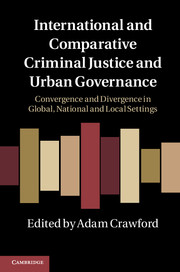 International and Comparative Criminal Justice and Urban Governance
International and Comparative Criminal Justice and Urban Governance Book contents
- Frontmatter
- Contents
- List of figures
- List of tables
- Notes on contributors
- Acknowledgements
- 1 International and comparative criminal justice and urban governance
- PART 1 International criminal justice
- 2 Unintended justice: the United Nations Security Council and international criminal governance
- 3 The International Criminal Court and the state of the American exception
- 4 Universal crimes, universal justice? The legitimacy of the international response to genocide, crimes against humanity and war crimes
- 5 Locating victim communities within global justice and governance
- 6 Dealing with war crimes in Bosnia: retributive and restorative options through the eyes of the population
- 7 Shaping penal policy from above? The role of the Grand Chamber of the European Court of Human Rights
- PART 2 Comparative penal policies
- PART 3 Comparative crime control and urban governance
- Index
- References
4 - Universal crimes, universal justice? The legitimacy of the international response to genocide, crimes against humanity and war crimes
from PART 1 - International criminal justice
Published online by Cambridge University Press: 05 June 2011
- Frontmatter
- Contents
- List of figures
- List of tables
- Notes on contributors
- Acknowledgements
- 1 International and comparative criminal justice and urban governance
- PART 1 International criminal justice
- 2 Unintended justice: the United Nations Security Council and international criminal governance
- 3 The International Criminal Court and the state of the American exception
- 4 Universal crimes, universal justice? The legitimacy of the international response to genocide, crimes against humanity and war crimes
- 5 Locating victim communities within global justice and governance
- 6 Dealing with war crimes in Bosnia: retributive and restorative options through the eyes of the population
- 7 Shaping penal policy from above? The role of the Grand Chamber of the European Court of Human Rights
- PART 2 Comparative penal policies
- PART 3 Comparative crime control and urban governance
- Index
- References
Summary
Introduction
The title of this chapter may appear somewhat ambiguous at first sight, as it implies both an empirical and a normative question. Do universal crimes lead to universal justice? And should universal crimes lead to universal justice? However, as with all crime, the very nature of the phenomenon and any intellectual inquiry into it are normative matters and the questions as to whether we either have, or should have, universal justice cannot be regarded as separate issues. Moreover, the answer depends on many things, but most importantly on who is asking the question, who is doing the answering, and what they define as crime and as justice. In international legal-political terms, universal justice and universal crimes are equated with the definitions found in the international instruments providing procedures for judging and sanctions against specifically delineated ‘core international crimes’: genocide, crimes against humanity and war crimes. Logically, universal justice then becomes the reaction of the international community through ad hoc tribunals or the International Criminal Court (ICC), or the incorporation of such international definitions into national criminal law and procedure according to the universality principle of jurisdiction.
However, the fact that we have a body of international criminal law that can be institutionally upheld does not of itself mean that we have universal justice. Neither should the legitimacy of the international response be taken for granted. For, to be legitimate, any form of justice must deliver in many senses of the word – and universal justice must deliver universally.
- Type
- Chapter
- Information
- International and Comparative Criminal Justice and Urban GovernanceConvergence and Divergence in Global, National and Local Settings, pp. 86 - 108Publisher: Cambridge University PressPrint publication year: 2011
References
- 2
- Cited by


